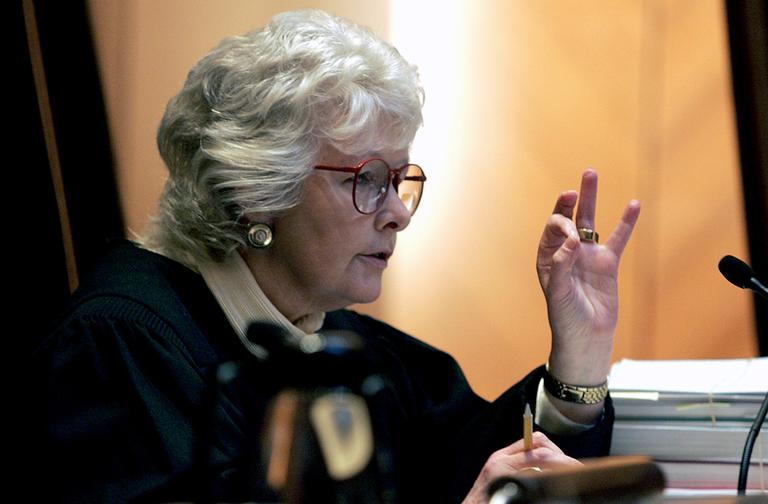Advertisement
Mass. Chief Justice Marshall Retires

Massachusetts Chief Justice Margaret Marshall, who wrote the landmark ruling making the state the first to legalize gay marriage, said Wednesday she's retiring to spend time with her husband, who has Parkinson's disease.
Marshall said she would step down in October to be with her husband, former New York Times columnist Anthony Lewis, a two-time Pulitzer Prize winner who retired in 2001.
"I will relinquish my role as chief justice in order that without distraction, Tony and I will be able to enjoy our final seasons together," she said.
Marshall was first appointed to the bench by then-Gov. William Weld in 1996, after four years as general counsel and vice president of Harvard University. She became chief justice three years later.
Perhaps her most enduring — and maligned — legacy on the court was the decision in 2003 that allowed Massachusetts to become the first state to legalize gay marriage.
[sidebar title="Legal Community Reaction" width="320" align="right"]
The legal community is taken aback by Marshall's decision. Massachusetts Bar Association President Valerie Yarashus says Marshall has shown inspired leadership and courage on difficult issues.
As for the next chief justice, Yarashus says there's currently a crisis in court funding and the replacement must be a strong advocate for the judiciary.
"Chief Justice Marshall started many important improvements that need to be followed through, including a top-to-bottom look at the functioning of the courts through the Court Management Advisory Board," she said.
There's no word yet as to who Gov. Deval Patrick may choose to be Marshall's replacement.
Advertisement
-- WBUR's Steve Brown [/sidebar]
In the 4-3 ruling, Marshall said the denying gays and lesbians the right to marriage "works a deep and scarring hardship on a very real segment of the community for no rational reason."
"It cannot be rational under our laws, and indeed it is not permitted, to penalize children by depriving them of State benefits because the State disapproves of their parents' sexual orientation."
The ruling — and justices — were widely criticized by opponents of gay marriage as being judicial activists.
Weld said Wednesday that the criticism was unwarranted.
"I knew from early on she was committed to justice for everybody," he said, adding that he dropped her a note a day after the gay marriage ruling to say "she had done the right thing."
Kris Mineau, president of the Massachusetts Family Institute, welcomed the news that Marshall was leaving the court, saying the state had been under "Marshall law" since the 2003 ruling.
"In our opinion, her legacy will have a far-reaching negative effect on the health of our commonwealth," he said.
He said he hoped Massachusetts residents would eventually be allowed to vote on the definition of marriage.
Marshall said in 2005 — a year after the first gay marriages were performed — that she was concerned about political attacks on the judiciary.
"I worry when people of influence use vague, loaded terms like 'judicial activist' to skew public debate or to intimidate judges," Marshall said. "I worry when judicial independence is seen as a problem to be solved and not a value to be cherished."
Marshall, a native of South Africa, was the first immigrant and first woman to lead the state's 320-year-old Supreme Judicial Court. She was a white student leader of the anti-apartheid movement in the 1960s.
This program aired on July 21, 2010. The audio for this program is not available.